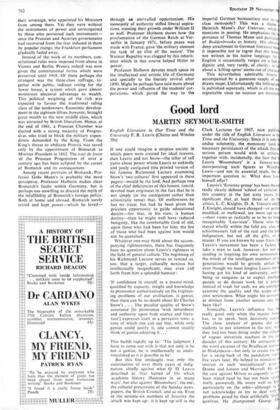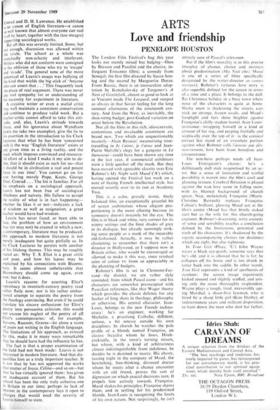Good lord
MARTIN SEYMOUR-SMITH
English Literature in Our Time and the University F. R. Leavis (Chatto and Windus 30s)
If one could imagine a utopian society in which peers were created for ideal reasons, then Leavis and not Snow—the teller of tall yarns about power whom Leavis so unkindly and justly castigated (the printed version of his famous Richmond Lecture examining Snow's 'two cultures' first appeared in these pages)—would be the lord. And perhaps one of the chief deficiencies of this honest, rancid, devoted man originates in the fact that he is not simply (in the omnipotent rather than aristocratic sense) that. Of mellowness he has no trace; but had he been given the priceless opportunity to guide educational destiny—for that, in his view, is human destiny—then he might well have radiated benignity, like the comfortable God of old, upon those who had been for him; the fire of those who had been against him would not be quenched.
Whatever one may think about the accom- panying righteousness, there has frequently been no question about Leavis's rightness in the field of general culture. The beginning of his Richmond Lecture serves to remind us, too, that a target, culturally noxious but intellectually insignificant, may even call forth from him a splendid humour: 'If confidence in oneself as a master-mind, qualified by capacity, insight and knowledge to pronounce authoritatively on the frighten- ing problems of our civilisation, is genius, then there can be no doubt about Sir Charles Snow's . . . The peculiar quality of Snow's assurance [to pronounce `with inwardness and authority upon both science and litera- ture'] expresses itself in a pervasive tone; a tone of which one can say that, while only genius could justify it, one cannot readily think of genius adopting it ...'
This builds rapidly up to: 'The judgment I have to come out with is that not only is he not a genius; he is intellectually as undis- tinguished as it is possible to be'.
But this fine onslaught was only the culmination of over thirty years of indig- nation, chiefly against what Q. D. Leavis described as 'that hatred of life which academic history illustrates in so many ways', but also against 'Bloomsbury', the BBC, the cultural pretensions of the Sunday news- papers, the British Council, and so on. Even in the seventy-six numbers of Scrutiny the attack was kept up: it is kept up still in the Clark Lectures for 1967, now publish under the title of English Literature in Time and the University. Since it is only undue solemnity, the monotony (and necessary persistance) of the attack that a serious person would wish to criticise together with, incidentally, the fact that Leavis 'Bloomsbury' is a fantasy-wort incorporating such figures as Wyndha Lewis—and not its essential truth, the a important question is: What does Lea, himself offer?
Leavis's 'Scrutiny group' has been the on really clearly defined 'school of criticism' this country in the last sixty years. It significant that at least three of its critics, L. C. Knights, D. A. Traversi and J. Enright, should have changed—or perha modified, or mellowed, are more apt wor —their views so radically as to be no long recognisably Teavisian'. Those who ha stayed wholly within the fold are, alas. s schoolmasters full of the zeal and the ha indignation, but not all the gifts, of master. If you are known by your fruits. th Leavis's movement has been a failure. take a man to task, however, for not s ceeding in inspiring his own seriousness the minds of the intelligent members of t generations would be grossly unfair. B even though we must forgive Leavis for n having got his kind of university, and being so sanguine as to expect intellig people to do decent work for a pitta instead of trash for cash, we are entitled examine the quality and the scope of own seriousness. What might his univera as distinct from another serious one. ha been like?
Ironically, Leavis's influence has I• really good only when the master him has, so to speak. been decisively reject• The close analysis of poems did ca students to pay attention to the text. whi they had not been doing under the influe of vaguer university teachers in the ea decades of this century. He corrected. the worst excesses of the Bradleyan approa to Shakespeare—but only to create the n for a swing-back of the pendulum twen, five years later. He helped to stimulate n interest in such 'metaphysical' poets Donne and Jonson and Marvell. He sta the case against Milton as cogently as it been stated (and he has not been sand torily answered). He wrote well on Ke particularly on the odes—although he not acknowledge or try to deal with problems posed by their artificially 'liter. qualities. He championed George E Conrad and D. H. Lawrence. He established a set canon of English literature—a canon so well known that almost everyone can reel it of by heart, together with the (too meagre) supporting sociological works. But all this was severely limited. Some, but not enough, discussion was allowed within the circle. The school as a whole was wretchedly non-eclectic and intolerant. Writers who did not conform were consigned to the oblivion of those who try to 'escape' and 'evade'. The general tone of the more polemical of Leavis's essays was bullying of the kind that wields the big stick of 'Anyone who can assert that ...' This frequently took the place of real argument. There was never any real sympathy for or understanding of the necessity for experiment in literature.
A creative writer or even a useful critic may well maintain a consistent conservatism and continue to produce valid work. But a teacher-critic cannot afford to take this atti- tude; and, alas, Leavis's attitude towards Joyce, and his ignorance about Wyndham Lewis (to take two examples), give the lie to his assertion in the introduction to his Clark Lectures that what he has been 'concerned with is the way "English literature" exists at any given time as a living reality, and the need, which imposes convinced and resource- ful effort of a kind I make it my aim to de- fine, that it should exist as such for us—that it should be in civilisation a real and potent force in our time'. You cannot go on for ever having merely Pope, Keats, George Eliot, Conrad ... The list is familiar. For all his emphasis on a sociological approach, Leavis has not been free of sociological blindness and naivety. His failure to accept the reality of what is in fact happening— whether he likes it or not—indicates a lack of wisdom as well as resignation; a great teacher would have had wisdom.
Leavis has never faced, or been able to face, the problem of how an environment may (or may not) be created in which a new, a contemporary, literature may be produced. His approach to modern literature is not merely inadequate but quite pitifully so. In his Clark Lectures he persists with another of his lifelong themes. This may be roughly stated as: Why T. S. Eliot is a great critic and poet, and how his lapses may be explained by his connections with Blooms- bury. It seems almost unbelievable that Bloomsbury should come up again, even now; but it does .
Leavis's reasons for asserting Eliot's supremacy in twentieth-century poetry read rather flatly now; nor is his rather embar- rassed attempt to separate the poetry from the theology convincing. But even if he could translate his sincere enthusiasm for Eliot's poetry into persuasive criticism, this would not excuse his neglect of the poetry of all Eliot's contemporaries: of, for example, Stevens, Ransom, Graves—let alone a score of poets not writing in the English language. The limitations of his approach, as evinced by this, make it in many ways remarkable that he should have had the influence he has. The fact is that a proper examination of the field had not been made: Leavis is not interested in modern literature. And that dis- qualifies him as a truly important teacher. It is not that he has not approved the works that matter of Joyce, Celine—and so on—but that he has virtually ignored them: has given an inadequate account of them. But his school has been the only truly cohesive one in Britain in our time; perhaps its lack of interest in the contemporary lays it open to charges that would need the severity of Leavis himself to state.











































 Previous page
Previous page